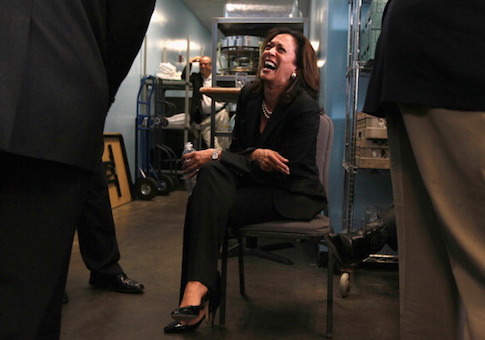The first legislation Sen. Kamala Harris (D., Calif.) introduced when she took office aimed to upend the "unjust and unfair" cash bail system, but her top priority back in 2004 as San Francisco district attorney was to make bail in the city more expensive.
The current argument against cash bail put forth by Harris, who introduced the legislation with Sen. Rand Paul (R., Ky.) and talks about it often on the campaign trail, is that it "penalizes the poor" by "design." She points to cash bail in her latest book as a major contributor to systemic racism in the criminal justice system and advocates for it to be replaced.
This was not her view when she took the reins of the San Francisco district attorney's office, according to a May 2004 interview she did with the Commonwealth Club of California. Harris told the audience one of her top "priorities" in her first 100 days as district attorney was making bail more expensive.
"On a daily basis, the work I have to do and where I have to put my mind in terms of my priorities is on things like sitting down with Russ [Guintini] my chief assistant and talking with him about the fact we are going to change the bail schedule in San Francisco," Harris said. "We are in the process of asking the bench, the judiciary, to reevaluate the fact that we require people who have been arrested to pay a lot less than other counties."
Harris said people were coming to San Francisco "to commit crimes because it's cheaper to do it."
"You know, we have to do something about that," she said. "Those are things I'm spending my time on."
The San Francisco Chronicle reported in June 2004 that following a "nudge from the district attorney's office," the court decided it would be "doubling, tripling and even quadrupling bail" for people arrested on weapons-related charges. The changes "put the usually lenient city on par" with neighboring counties, according to the report.
There are set bail amounts for each crime in San Francisco. A look at the bail schedules in 2010, the last year Harris was district attorney, show bail was set at thousands of dollars for minor offenses, e.g., $5,000 for petty theft.
Harris writes in her new book, The Truths We Hold, that she was keenly aware of the injustice caused by high bail costs when she was district attorney.
"When I was district attorney, I knew that every day, families were leaving the Hall of Justice, crossing the street, walking into those bail bonds offices, having done whatever it took to get the cash to pay the bondsmen—pawning their possessions, securing predatory payday loans, asking for help from their friends or at church," she writes. "I also knew that people with defensible cases were taking guilty pleas just so they could get out of jail and back to their job or home to their kids."
Harris said during a 2017 speech to the NAACP it was her experience as district attorney that taught her how important bail reform is.
"Looking at the issues from that experience and background has led me to focus, among many issues, on the issue of money bail," Harris said.
Her previous book, Smart on Crime, intended as a roadmap for "necessary shifts" needed in the criminal justice system, makes no mention of bail.
The general shift on bail from Harris appears to have come after she was elected to the U.S. Senate.
A Dec. 10, 2016, SF Gate report, "Harris shifts, says bail system isn't fair to the poor," shows Harris had earlier in the year defended the cash-bail system from charges it was unconstitutional, with her office saying in June filings that the system "does not make classifications based on wealth, but instead on the seriousness of criminal offenses." After her election, her office said, "cash bail systems have a disparate impact on the poor" and declined to defend them.
Harris spokesman Ian Sams did not respond to requests for comment.
A federal judge struck down San Francisco's cash-bail system earlier this month, saying the system "provides a 'Get Out of Jail’ card for anyone with sufficient means to afford it." California voters will vote next year on whether to abolish the cash-bail system entirely, replacing it with a system where judges decide whether to keep defendants in custody or release them while they await trial.
Harris has said she was a "progressive prosecutor" during her years in top California law enforcement roles. Criminal justice reform advocates have challenged the label, arguing she was "on the wrong side of history" on major issues.
Since she was elected to the Senate, Harris has also reversed her opinion on legalizing marijuana and decriminalizing prostitution.
